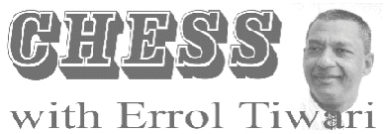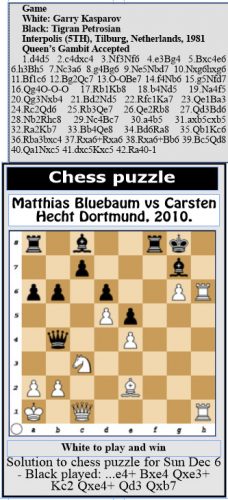
The Under-10 representatives were Arysh Raghunauth and Anaya Lall; Under-12, Kyle Couchman and Harmony Dodson; Under-14, Ronan Lee and Malihu Rajkumar; Under-16, Joshua Khan and Anasie Fredericks; and Under-18, Ethan Lee, and Sasha Shariff.
Guyana emerged from the competition favour-ably, taking into consideration the strength of the contestants. The finest chess players representing more than 160 nations competed at the tournament. A future world champion may well have been playing.
Over a decade ago, I chatted with the non-resident Ambassador to Guyana from Iceland during a meeting at the Ministry of Foreign Affairs. He pointed out that a country to become noteworthy in chess, something extraordinary has to happen that never occurred previously. Iceland was catapulted to international chess prominence when the Fischer-Spassky world championship match was played there. Before that match, Iceland was little known in chess circles. However, during the match and even before the match began, the attention of the world was focused on Iceland. That is what the Ambassador meant when he said something extraordinary has to occur for a country to enjoy chess prominence.
In the Guyana context, I suppose we have to produce a chess grandmaster. I would not say we embraced a lackadaisical attitude that prevented us from creating a grandmaster in times past. The conditions did not favour us in those times but now we have the internet and we enjoy practical over-the-board and online tournaments. Currently, the conditions are excellent to create a grandmaster. You might ask what is so special about finding a grandmaster. Well for one thing, it would give the country chess stardom among Caribbean nations.
India waited a long time for its first grandmaster. And that grandmaster, in the person of Viswanathan Anand, became world champion. Long before Anand, there was the unusual Sultan Khan (1905-1966) who showed a breathtaking aptitude for the game. He played international chess during the 1920s and the early 1930s then disappeared into obscurity. He toppled such chess giants as Jose Raul Capablanca and Dr Alexander Alekhine, both world champions, and engaged the best in his time. The only parallel to Khan was mathematician Srinivasa Ramanujan, who appeared out of nowhere and sent a letter to the great G H Hardy in England. The letter contained 120 theorems and Hardy was fascinated. Ramanujan was invited to Cambridge University to explain his theorems. Hardy’s contention was that the theorems must be true. If they were not, who would possess the imagination to invent them.







